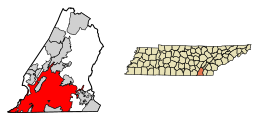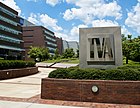**Historical Overview**:
– Chattanooga played a crucial role during the American Civil War due to its railroad connections.
– Post-war, the city developed into a major industrial hub in the Southeast.
– Chattanooga’s economy is driven by industries like automotive, manufacturing, healthcare, and tourism.
– The city is a key transit hub with multiple highways and rail lines.
– Located at the crossroads of the Appalachian Mountains, Chattanooga has a rich history dating back to Native American presence in the Upper Paleolithic period.
– The city was incorporated in 1839, benefiting from its river and railroad connections.
– Chattanooga was a vital hub for the Confederacy during the Civil War and became a major railroad and industrial center post-war.
– The city faced challenges in the 1970s due to de-industrialization and social division.
**Geography and Cityscape**:
– Chattanooga covers a total area of 144.6 square miles, with a mix of land and water.
– Situated between the Tennessee River and surrounding mountains, the city is impounded by the Chickamauga Dam.
– Downtown Chattanooga offers entertainment, dining, and cultural attractions like the Tennessee Aquarium and Walnut Street Bridge.
– Notable buildings include the Aquarium, Republic Centre, and historical sites like The Read House Hotel.
– Neighborhoods in Chattanooga include Ferger Place, Fort Wood, St. Elmo, East Brainerd, and Highland Park.
**Civil Rights Movement**:
– Chattanooga has a significant history in the Civil Rights Movement.
– Events like sit-in protests at Howard High School in 1960 and the election of the first African-American official in 1971 shaped the city’s civil rights landscape.
– The city experienced racial tensions, riots, and legal challenges, leading to changes in the voting system.
– Mayor Rudy Olgiatti’s use of water hoses on protesters and the aftermath of a Klan shooting in 1980 were pivotal moments in Chattanooga’s civil rights history.
**Infrastructure, Development, and Economy**:
– Chattanooga boasts a diversified economy with industries like manufacturing, services, and notable businesses such as BlueCross BlueShield and Coca-Cola bottling plant.
– Major employers include Volkswagen, Amazon, and McKee Foods, with a thriving retail sector.
– The city has seen significant private investment, with infrastructure developments like the EPB fiber optic grid.
– Chattanooga’s infrastructure includes bridges over the Tennessee River, downtown parks, and attractions like the Tennessee Aquarium.
– The city’s utilities are provided by entities like EPB for electric power and high-speed Internet, Tennessee-American Water Company for water, and Chattanooga Gas Company for gas.
**Demographics, Population, and Recognition**:
– Chattanooga’s population has fluctuated over the years, with the 2020 census recording 181,099 residents.
– Racial composition in 2019 was 62.3% White and 31.4% Black.
– The city has received national and regional recognition for livability, housing, public art projects, and investments in solar energy.
– Chattanooga’s Metropolitan Statistical Area grew from 476,531 to 529,222 people from 2000 to 2010.
– The city’s demographics show a shift in population, household sizes, and poverty statistics over the years.
Chattanooga (/ˌtʃætəˈnuːɡə/ CHAT-ə-NOO-gə) is a city in and the county seat of Hamilton County, Tennessee, United States. It is located along the Tennessee River, and borders Georgia to the south. With a population of 181,099 in 2020, it is Tennessee's fourth-largest city and one of the two principal cities of East Tennessee, along with Knoxville. It anchors the Chattanooga metropolitan area, Tennessee's fourth-largest metropolitan statistical area, as well as a larger three-state area that includes Southeast Tennessee, Northwest Georgia, and Northeast Alabama.
Chattanooga | |
|---|---|
From top, left to right: Chattanooga Skyline in 2023, Hunter Museum of American Art, Creative Discovery Museum, Tennessee Aquarium, Chattanooga Choo-Choo Hotel and the TVA Offices | |
| Nicknames: Scenic City (official); Chatt, Chattown, Gig City, Nooga, and River City | |
 Location of Chattanooga in Hamilton County, Tennessee | |
| Coordinates: 35°2′44″N 85°16′2″W / 35.04556°N 85.26722°W | |
| Country | United States |
| State | Tennessee |
| County | Hamilton |
| Incorporated | 1839 |
| Government | |
| • Type | Mayor-council |
| • Mayor | Tim Kelly (I) |
| Area | |
| • City | 150.08 sq mi (388.70 km2) |
| • Land | 142.35 sq mi (368.69 km2) |
| • Water | 7.73 sq mi (20.01 km2) |
| Elevation | 676 ft (206 m) |
| Population (2020) | |
| • City | 181,099 |
| • Rank | 142nd in the United States 4th in Tennessee |
| • Density | 1,272.19/sq mi (491.20/km2) |
| • Urban | 398,569 (US: 105th) |
| • Urban density | 1,366.4/sq mi (527.6/km2) |
| • Metro | 562,647 (US: 101st) |
| Demonym | Chattanoogan |
| Time zone | UTC−5 (EST) |
| • Summer (DST) | UTC−4 (EDT) |
| ZIP code(s) | 37401-37412, 37414-37416, 37419, 37421-37422, 37424, 37450 |
| Area code | 423 |
| FIPS code | 47-14000 |
| GNIS feature ID | 1307240 |
| Airport | Chattanooga Metropolitan Airport |
| Public transportation | CARTA |
| Waterways | Tennessee River |
| Website | www |
Chattanooga was a crucial city during the American Civil War, due to the multiple railroads that converge there. After the war, the railroads allowed for the city to grow into one of the Southeastern United States' largest heavy industrial hubs. Today, major industry that drives the economy includes automotive, advanced manufacturing, food and beverage production, healthcare, insurance, tourism, and back office and corporate headquarters. Chattanooga remains a transit hub in the present day, served by multiple Interstate highways and railroad lines. It is 118 miles (190 km) northwest of Atlanta, Georgia, 112 miles (180 km) southwest of Knoxville, Tennessee, 134 miles (216 km) southeast of Nashville, Tennessee, 102 miles (164 km) east-northeast of Huntsville, Alabama, and 147 miles (237 km) northeast of Birmingham, Alabama.
Divided by the Tennessee River, Chattanooga is at the transition between the ridge-and-valley Appalachians and the Cumberland Plateau, both of which are part of the larger Appalachian Mountains. Its official nickname is the "Scenic City", alluding to the surrounding mountains, ridges, and valleys. Unofficial nicknames include "River City", "Chatt", "Nooga", "Chattown", and "Gig City", the latter a reference to its claims that it has the fastest internet service in the Western Hemisphere.
Chattanooga is internationally known from the 1941 hit song "Chattanooga Choo Choo" by Glenn Miller and his orchestra. It is home to the University of Tennessee at Chattanooga (UTC) and Chattanooga State Community College.











